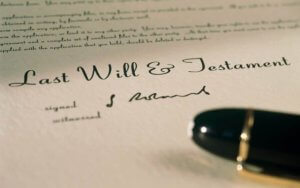- UK trusts, tax and estate planning
- Wills & Succession Planning

Shorter Reads
Coronavirus – Can I create a Will while observing social distancing?
With social distancing now the norm, how are individuals supposed to execute Wills without breaching official guidance?
2 minute read
Published 20 April 2020
Key information
- Specialisms
- Private Wealth
Commentators have argued for decades that the rules governing the preparation and execution of Wills are outdated. However, the current tests posed by coronavirus are like nothing contemporary legal practice has seen before.
The valid execution of Wills is governed by the Wills Act 1837, which was enacted in the same year that Queen Victoria ascended to the throne and Morse Code was invented. Those rules require (amongst other criteria) that the testator’s signature be witnessed by two or more individuals present at the same time. With social distancing now the norm, how are individuals supposed to execute Wills without breaching official guidance? Are the current rules fit for purpose in a world now dominated by Microsoft Teams, Zoom and WhatsApp?
What can be done in the present circumstances?
A testator might be tempted to turn to the nearest individuals to witness a Will, likely to be their family. However, having family witnesses raises the question whether the testator was unduly influenced into signing the document. Consequently, the Wills Act 1837 specifies that, if a witness is also a beneficiary (or the spouse or civil partner of a beneficiary), then that witness cannot benefit under the Will, although the remainder of the Will remains valid.
A witness only needs to see the testator sign the Will and, provided everyone respects the social distancing guidelines, there are several ways to execute a Will:
- The parties could stand far apart in the same room, with each signatory sliding the Will to the next person to sign.
- The testator could sign by their window with both witnesses watching from the other side of the glass. The Will could then be passed through the letterbox to sign and return by the witnesses.
- The signing could take place in the garden, or in the street with neighbours, with each signatory stepping forward in turn to sign.
- The testator could sit in their car and sign on the dashboard, with the witnesses then signing on the bonnet.
In addition, each individual should ideally sign with a different pen. If there is only one pen, consider wearing gloves or wiping down the pen with a handwipe or antibacterial gel between uses.
Alternatively, the testator could sign the Will beforehand and then confirm to the witnesses that the signature is his. However, as the witnesses must both be present at the same time anyway, signing in their presence is always the preferable option if possible.
Is the law around the execution of Wills being modernised or relaxed?
In 2019 the Law Commission released a report on the electronic execution of documents, in an attempt to help coax English law into the 21st Century. However, Wills were expressly excluded from the scope of the report, with the Commission acknowledging that there are circumstances where the law is particularly prescriptive as to the execution of a document. In any event, the report also acknowledges that deeds must be signed in the physical presence of a witness, even if all the signatories in fact sign electronically. Therefore, practically speaking, Wills must continue to be executed by hand with two witnesses physically present.
However, as at the date of this article, the Law Society and the Ministry of Justice are in discussions about whether the requirements for executing Wills can be relaxed in light of the current environment. There are a variety of options on the table, including:
- giving judges more flexibility to decide what constitutes a Will (more like the Australian system);
- allowing individuals to handwrite their Wills without witnesses (more like some European jurisdictions); and/or
- a way in which Wills might be witnessed electronically.
These developments may build on existing provisions of the Wills Act 1837 permitting the creation of “privileged Wills”, created by members of the armed forces when they must do so quickly and so are unable to comply with the usual execution requirements.
The inevitable question to be asked would then be, once the threat of coronavirus has passed, would the Ministry of Justice seek to revert back to the current rules, or is it not possible to put the toothpaste back in the tube?
This article was first published in EPrivateClient in April 2020.
Related content
Shorter Reads
Coronavirus – Can I create a Will while observing social distancing?
With social distancing now the norm, how are individuals supposed to execute Wills without breaching official guidance?
Published 20 April 2020
Associated sectors / services
Authors
Commentators have argued for decades that the rules governing the preparation and execution of Wills are outdated. However, the current tests posed by coronavirus are like nothing contemporary legal practice has seen before.
The valid execution of Wills is governed by the Wills Act 1837, which was enacted in the same year that Queen Victoria ascended to the throne and Morse Code was invented. Those rules require (amongst other criteria) that the testator’s signature be witnessed by two or more individuals present at the same time. With social distancing now the norm, how are individuals supposed to execute Wills without breaching official guidance? Are the current rules fit for purpose in a world now dominated by Microsoft Teams, Zoom and WhatsApp?
What can be done in the present circumstances?
A testator might be tempted to turn to the nearest individuals to witness a Will, likely to be their family. However, having family witnesses raises the question whether the testator was unduly influenced into signing the document. Consequently, the Wills Act 1837 specifies that, if a witness is also a beneficiary (or the spouse or civil partner of a beneficiary), then that witness cannot benefit under the Will, although the remainder of the Will remains valid.
A witness only needs to see the testator sign the Will and, provided everyone respects the social distancing guidelines, there are several ways to execute a Will:
- The parties could stand far apart in the same room, with each signatory sliding the Will to the next person to sign.
- The testator could sign by their window with both witnesses watching from the other side of the glass. The Will could then be passed through the letterbox to sign and return by the witnesses.
- The signing could take place in the garden, or in the street with neighbours, with each signatory stepping forward in turn to sign.
- The testator could sit in their car and sign on the dashboard, with the witnesses then signing on the bonnet.
In addition, each individual should ideally sign with a different pen. If there is only one pen, consider wearing gloves or wiping down the pen with a handwipe or antibacterial gel between uses.
Alternatively, the testator could sign the Will beforehand and then confirm to the witnesses that the signature is his. However, as the witnesses must both be present at the same time anyway, signing in their presence is always the preferable option if possible.
Is the law around the execution of Wills being modernised or relaxed?
In 2019 the Law Commission released a report on the electronic execution of documents, in an attempt to help coax English law into the 21st Century. However, Wills were expressly excluded from the scope of the report, with the Commission acknowledging that there are circumstances where the law is particularly prescriptive as to the execution of a document. In any event, the report also acknowledges that deeds must be signed in the physical presence of a witness, even if all the signatories in fact sign electronically. Therefore, practically speaking, Wills must continue to be executed by hand with two witnesses physically present.
However, as at the date of this article, the Law Society and the Ministry of Justice are in discussions about whether the requirements for executing Wills can be relaxed in light of the current environment. There are a variety of options on the table, including:
- giving judges more flexibility to decide what constitutes a Will (more like the Australian system);
- allowing individuals to handwrite their Wills without witnesses (more like some European jurisdictions); and/or
- a way in which Wills might be witnessed electronically.
These developments may build on existing provisions of the Wills Act 1837 permitting the creation of “privileged Wills”, created by members of the armed forces when they must do so quickly and so are unable to comply with the usual execution requirements.
The inevitable question to be asked would then be, once the threat of coronavirus has passed, would the Ministry of Justice seek to revert back to the current rules, or is it not possible to put the toothpaste back in the tube?
This article was first published in EPrivateClient in April 2020.
Associated sectors / services
- UK trusts, tax and estate planning
- Wills & Succession Planning
Authors
Need some more information? Make an enquiry below.
Subscribe
Please add your details and your areas of interest below
Article contributor
Aidan
GrantSenior Associate
Specialising in International trusts, tax & estate planning, Private wealth, UK trusts, tax & estate planning and US/UK Tax & estate planning
Enjoy reading our articles? why not subscribe to notifications so you’ll never miss one?
Subscribe to our articlesMessage us on WhatsApp (calling not available)
Please note that Collyer Bristow provides this service during office hours for general information and enquiries only and that no legal or other professional advice will be provided over the WhatsApp platform. Please also note that if you choose to use this platform your personal data is likely to be processed outside the UK and EEA, including in the US. Appropriate legal or other professional opinion should be taken before taking or omitting to take any action in respect of any specific problem. Collyer Bristow LLP accepts no liability for any loss or damage which may arise from reliance on information provided. All information will be deleted immediately upon completion of a conversation.
Close

























































